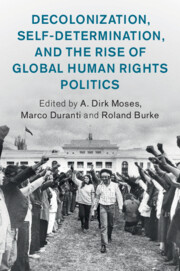Book contents
- Decolonization, Self-Determination, and the Rise of Global Human Rights Politics
- Human Rights in History
- Decolonization, Self-Determination, and the Rise of Global Human Rights Politics
- Copyright page
- Contents
- Notes on Contributors
- Acknowledgments
- Introduction
- Part I Anti-Colonial Struggles and the Right to Self-Determination
- Part II Postcolonial Statehood and Global Human Rights Norms
- 6 Cutting Out the Ulcer and Washing Away the Incubus of the Past
- 7 Codifying Minority Rights
- 8 Between Ambitions and Caution
- 9 “From This Era of Passionate Self-Discovery”
- 10 Reentering Histories of Past Imperial Violence
- Part III Colonial and Neocolonial Responses
- Index
8 - Between Ambitions and Caution
India, Human Rights, and Self-Determination at the United Nations
from Part II - Postcolonial Statehood and Global Human Rights Norms
Published online by Cambridge University Press: 24 June 2020
- Decolonization, Self-Determination, and the Rise of Global Human Rights Politics
- Human Rights in History
- Decolonization, Self-Determination, and the Rise of Global Human Rights Politics
- Copyright page
- Contents
- Notes on Contributors
- Acknowledgments
- Introduction
- Part I Anti-Colonial Struggles and the Right to Self-Determination
- Part II Postcolonial Statehood and Global Human Rights Norms
- 6 Cutting Out the Ulcer and Washing Away the Incubus of the Past
- 7 Codifying Minority Rights
- 8 Between Ambitions and Caution
- 9 “From This Era of Passionate Self-Discovery”
- 10 Reentering Histories of Past Imperial Violence
- Part III Colonial and Neocolonial Responses
- Index
Summary
This chapter investigates India’s participation in the emergence of the UN human rights system as a lens through which to revisit the historical relation between the human rights discourse, anti-colonialism, and decolonization. It advances three main arguments. First, in the case of India, human rights were not a means to promote the principle of self-determination. A newly independent India sought to distance itself from its colonial predecessor by using the language of human rights, believing that the nascent nationalist regime could transform itself into a postcolonial (and anti-colonial) actor that rejected an older international order in which state sovereignty reigned supreme. Second, Indians subsequently saw human rights as a framework through which to protect Indians living outside India as a result of years of organized migration during the colonial period. Third, India’s quest for “normative leadership” at the UN and the concern for diasporic Indians did not lead, however, to an unqualified advocacy for human rights. This chapter offers a counterpoint to an emergent scholarly narrative in which the initial enthusiasm for universal human rights among the countries of the newly decolonized world waned in the 1960s as many of them came under authoritarian rule.
- Type
- Chapter
- Information
- Publisher: Cambridge University PressPrint publication year: 2020
- 3
- Cited by

